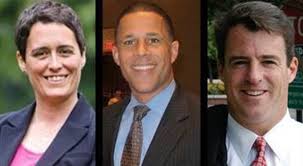Links to Part I, Part II, and Part III of this series.
District 25 (D): At 85% black VAP, this Prince George’s Senate district has a higher share of black voters than any other in the State. Four-term Del. Melony Griffith is challenging incumbent Sen. Ulysses Currie, who has served in the Senate for five terms and had two prior terms in the House.
Currie has the clear financial advantage with $115K in his account compared to just $40K in Griffith’s. Finances definitely give Currie a leg up, especially since neither can raise funds during the session and the period between the end of it and the primary will be short. Still, Griffith ought to have enough for a viable campaign.
Griffith was on Doug Gansler’s short list for the lieutenant governor slot, though that went to Del. Jolene Ivey. Griffith served as Prince George’s House delegation chair just before Ivey. While Griffith has been linked with Gansler, Currie has endorsed Brown.
No surprise there. Currie plucked Brown out and put him on his ticket as a candidate for delegate back in 1998, giving the Lieutenant Governor his start in Maryland politics. Their bond is tight and goes back a long way. In a year when Brown will be looking for every vote in this district and will back Currie, this gives Currie a huge advantage over his opponent.
Currie’s major problem is a spate of bad press resulting from ethical problems. He was tried in 2011 on federal bribery charges related to his representation of Shoppers Food Warehouse as community relations consultant, which he failed to disclose on his State ethics form.
Though Currie was found not guilty, the Senate censured him on the recommendation of the Ethics Committee. Currie has been stripped of his chair of the powerful Budget and Taxation Committee and can no longer serve on conference committees with the House.
While ethics problems led to Currie’s exit from the Senate leadership despite his friendship with Senate President Mike Miller, Griffith has been part of Speaker Michael Busch’s leadership team in the House. She chairs the important Subcommittee on Pensions of the House Appropriations Committee and has been entrusted by Busch with various valuable assignments.
A final difference between Currie and Griffith is generational. Currie is in his mid-70s, while Griffith is in her early-50s. Currie has not faced a challenger since 2002 when he beat Prince George’s Community College Prof. Sharrarne Morton, a perennial candidate, with 65%. Prior to that, he had not faced another challenger in the primary since he beat Del. Michael Arrington to win the nomination with 61% in 1994.
Interestingly, Arrington is now a lobbyist and was also mentioned in connection with the Shoppers scandal. Arrington has also made the papers due to other ethical challenges, such as the receipt of Superbowl tickets while a delegate from Bruce Bereano, and involvement in the deal to build the football stadium.
Regardless, Currie has not run against another delegate for 20 years or had to run any campaign at all for over a decade, though he has been heavily involved with tickets in his district. Both Currie and Griffith have full slates this time. Currie has the edge here, as incumbent Del. Derrick Davis, a very powerful well-funded delegate, is running with Currie.
Despite the ethical problems, I give the edge to Currie. He was found not guilty and his link to Brown, Davis, and his financial advantage should trump the ethical problems. Currie also a courtly manner that I suspect voters like even if Griffith also has her appeal. Rating: Lean Currie.






